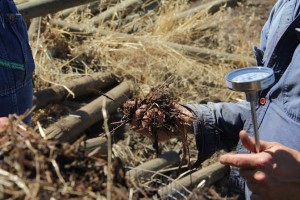COMPOST
by Lael Gerhart
Compost, sometimes called black gold, is a vital component to building healthy soil. Like soil, compost is a complex and living system. Each pile of compost has its own biology. What goes into the compost will influence the populations of microorganisms living within the pile. With careful management, compost makers can develop piles that are dominated by beneficial fungi or by beneficial bacteria.
Farmer Al has fallen in love with art of compost making, and for good reason. Research has shown that plants have preferences when it comes to the ratio of bacteria and fungi living within the soil. It turns out that annual plants, including vegetables, prefer bacterial dominated soils, while perennial plants, including fruit trees, prefer fungal dominate soils. By making our own compost, we are able to use what would normally be considered waste – unusable fruit and wood from pruning and thinning, to feed our pile. In so doing, we also save money and gas by not purchasing compost from an outside source, and we can customize our piles to favor fungi, which benefits our trees the most.
Our compost tea project is an exciting one. As we briefly discussed in our Newsletter featuring the Soil Food Web, plants produce chemicals called exudates that are excreted through their roots and leaves to attract and grow beneficial fungi and bacteria. We apply our compost all around the base of the trees to build healthy soil. But compost doesn’t stick to leaves, and that is where the tea comes in. Compost tea is a liquid form of the soil food web. We are spraying the leaves on every tree to inoculate them with our fungal dominant compost. The microbes in the tea will compete with pathogenic fungi such as mildew for space and food, hopefully out-competing them to their death! By establishing an ecology high in beneficial microbes on our trees, we also hope to evade the specter of brown – rot, another fungal disease, later in the season.
We sure will be happy if this works. Eliminating our need for an external input like sulfur for disease control, will make us more self – sufficient and sustainable. Pretty cool what a properly managed pile of “rubbish” can do!
To learn more about the composting that goes on at FHF, check out our Facebook page. To celebrate International Compost Awareness Week, we created a few videos for your enjoyment.

